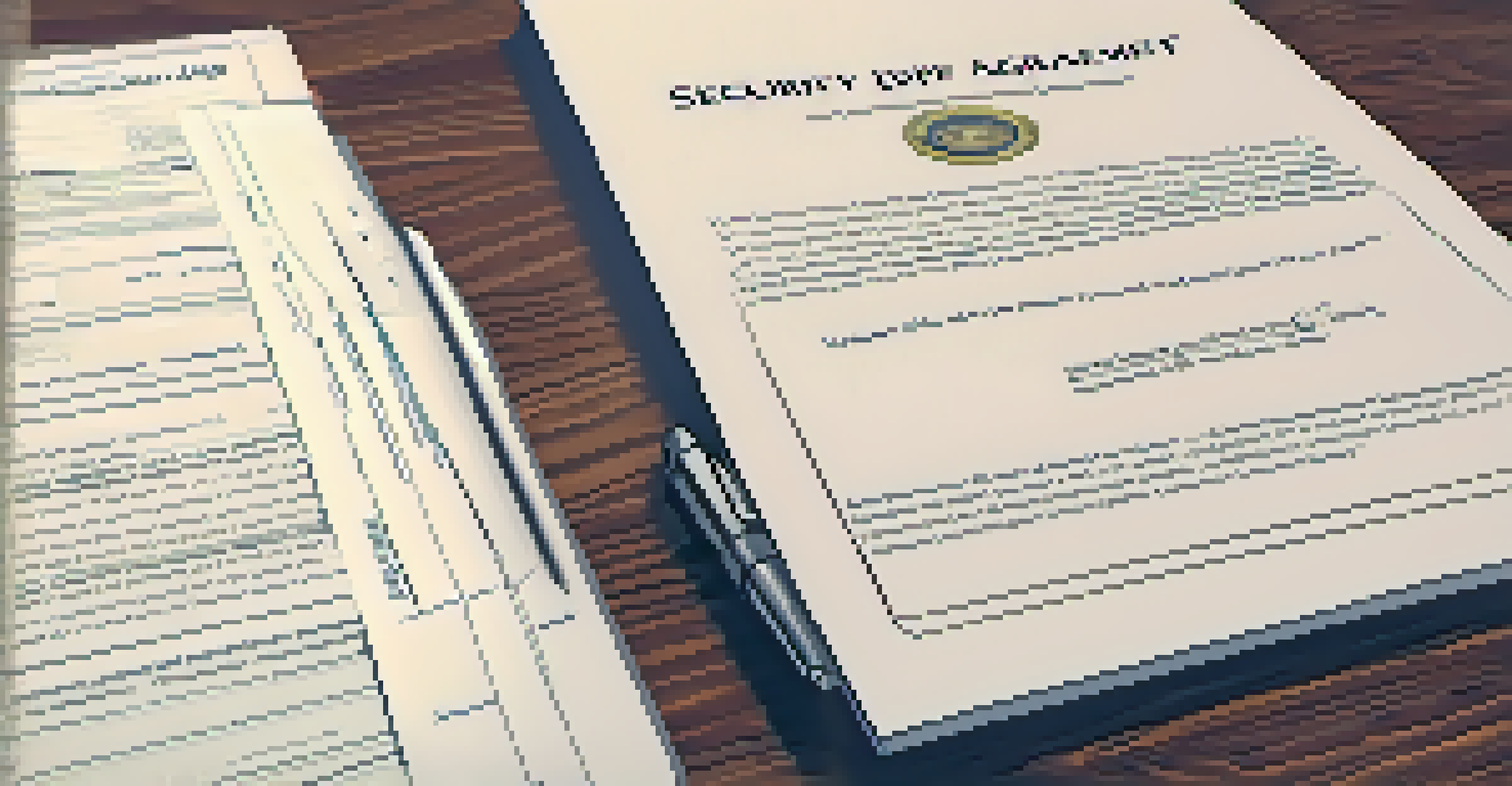Understanding Security Deposits: Guidelines for Managers

What is a Security Deposit and Its Purpose?
A security deposit is a sum of money collected from tenants before they move in, typically used to cover potential damages to the property. It acts as a financial safety net for landlords, providing assurance that any unforeseen costs can be managed. Think of it as a promise from tenants to maintain the property in good condition while they occupy it.
A security deposit serves as a protective measure for landlords, ensuring that their investment is safeguarded against unforeseen circumstances.
These deposits serve multiple purposes, such as covering unpaid rent, damages beyond normal wear and tear, or cleaning fees when a tenant vacates. By having this financial cushion, landlords can mitigate risks associated with property management. Overall, security deposits help foster a sense of responsibility among tenants regarding the upkeep of their living space.
Understanding the role and purpose of security deposits can empower property managers to set clear expectations with tenants from the outset. This clarity is crucial in preventing disputes later on, making the move-in process smoother for both parties.
Legal Guidelines for Collecting Security Deposits
When it comes to security deposits, it’s essential to be aware of the legal guidelines that vary by state or country. These laws dictate how much can be charged, the timeframe for returning the deposit, and the conditions under which deductions can be made. Familiarizing yourself with these regulations helps avoid potential legal pitfalls.

For instance, many regions limit the amount of security deposit to one or two months' rent. Additionally, landlords often have a specific timeline—usually 30 days—to return the deposit or provide an itemized list of deductions. Being knowledgeable about these rules not only protects you as a manager but also builds trust with tenants.
Understanding Security Deposits
Security deposits provide financial assurance for landlords while encouraging tenants to maintain the property.
By adhering to legal guidelines, you create a transparent and professional relationship with tenants. This can significantly reduce misunderstandings and disputes, paving the way for a successful tenancy.
Best Practices for Setting Security Deposit Amounts
Setting the right amount for a security deposit is crucial for both attracting tenants and protecting your investment. A common practice is to charge one month's rent, but this can vary based on the property’s condition, location, and market demand. Understanding local rental trends can inform your decision and ensure competitiveness.
Education is the most powerful weapon which you can use to change the world.
Moreover, it’s important to consider the tenant's profile when determining the deposit amount. For instance, first-time renters may appreciate lower deposits, while experienced tenants may be willing to pay more for desirable properties. This flexibility can help you find the right balance between safeguarding your property and accommodating your tenants.
Ultimately, the goal is to set a deposit that ensures security for you while remaining fair for tenants. Striking this balance can lead to a positive rental experience and reduce turnover rates.
Documenting Security Deposit Agreements
Documentation is key when it comes to security deposits; a well-drafted agreement protects both parties. This agreement should outline the deposit amount, the purpose, and the conditions for its return or deductions. A clear, written document eliminates ambiguity and can be invaluable in case of disputes.
Consider using a checklist during the move-in inspection to document the property's condition. Both the tenant and the manager can sign this checklist, providing a reference point that can help in discussions about damages later on. This process fosters transparency and accountability.
Legal Guidelines Matter
Familiarity with local laws regarding security deposits helps avoid disputes and fosters trust with tenants.
In addition to the initial agreement, keeping detailed records of any correspondence regarding the deposit is essential. This ensures that you have a comprehensive history that can support your decisions if any disagreements arise after the tenant moves out.
Handling Security Deposits During Move-Out
The move-out process is a critical time for managing security deposits, as it often leads to disputes over damages. Conducting a thorough inspection before the tenant leaves can identify any issues that need to be addressed. This proactive approach allows you to communicate findings with the tenant and set expectations for any deductions.
After the tenant vacates, it’s important to act promptly regarding the security deposit. Most laws require landlords to return the deposit or provide an itemized list of deductions within a set timeframe. Delaying this process can lead to frustration and potential legal challenges, so staying organized is essential.
By handling security deposits efficiently and fairly during move-out, you help maintain a positive reputation as a property manager. This reputation can lead to smoother future tenancies and even referrals from satisfied tenants.
Disputes Over Security Deposit Deductions
Disputes regarding security deposit deductions can be a common challenge for property managers. When a tenant disagrees with the deductions made from their deposit, it’s essential to have clear documentation to back your claims. This includes photographs, inspection reports, and any relevant correspondence with the tenant.
Open communication is key in resolving disputes amicably. Engaging in a dialogue with the tenant to explain your reasoning while considering their perspective can lead to a mutually beneficial resolution. If necessary, mediation can be an effective way to address disagreements without escalating to legal action.
Effective Documentation is Key
Clear agreements and thorough documentation protect both landlords and tenants, especially during move-out discussions.
Ultimately, being transparent and fair in your deductions can significantly reduce the likelihood of disputes. Building trust with tenants during their stay can lead to smoother interactions when it comes time to settle the security deposit.
Educating Tenants About Security Deposits
Educating tenants about security deposits can set the stage for a positive rental experience. Providing clear information on what the deposit covers, how it’s managed, and the conditions for its return can alleviate concerns. Consider including this information in the lease agreement or as a separate informational sheet.
Encouraging tenants to ask questions about the security deposit process fosters transparency and builds trust. When tenants feel informed and involved, they are more likely to take care of the property and understand the rationale behind any deductions.

Ultimately, a well-informed tenant is less likely to dispute security deposit issues, leading to a smoother landlord-tenant relationship. Investing time in education can yield long-term benefits for property managers.